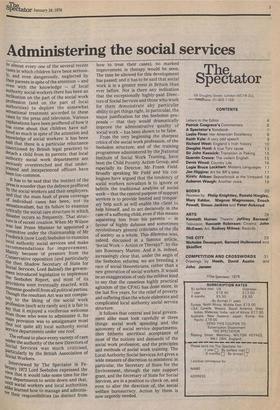Administering the social services
In almost every one of the several recent cases in which children have been seriously, and even dangerously, neglected by their parents in spite of the attention — and even with the knowledge — of local authority social workers there has been an inclination on the part of the social work Profession (and on the part of local authorities) to deplore the somewhat sensational treatment accorded to these Cases by the press and television. Various explanations have been proffered of how it has come about that children have suffered so much in spite of the attention and knowledge of social workers: it has been said that there is a particular reluctance (sanctioned by British legal practice) to detach a child from its parents; that local authority social work departments are seriously overstretched and that underrained and inexperienced officers have been too common.
It has to be said that the instinct of the press is sounder than the defence proffered bY the social workers and their employers; and that the main fault of press coverage of individual cases has been, not its sensationalism, but its failure to examine critically the social care structure in which disaster occurs so frequently. That structure is of recent creation. When Mr Wilson Was last Prime Minister he appointed a committee under the chairmanship of Mr ,Frederick (now Lord) Seebohm to examine *cal authority social services and make L'ecommendations for improvement. ,inainlY because 'of pressure from the `-onservative opposition (and particularly the then Shadow Secretary of State for Social Services, Lord Balniel) the governTent introduced legislation to implement "le Seebohm Report, and most of its Provisions were eventually enacted, with Mense goodwill from all political parties. .1notigh the resultant Act was not completely to the liking of the social work sProfession (such acts rarely are) it is fair to ,aY that it enjoyed a vociferous welcome Irotri those who were to administer it. Its Tain provision was to amalgamate most \ 'La not quite all) local authority social service departments under one roof. The refusal to place every variety of care rder the authority of the new Directors of ocial Services was much criticised, 12,articularly by the British Association of ocial Workers. b Interviewed by The Spectator in Fe,rutew arY 1972 Lord Seebohm expressed the :s that it would take some time for the utlevv departments to settle down and that, ain.Ltil social workers and local authorities +2Ke learned how to manage and adm inis'er their responsibilities (as distinct from how to treat their cases), no marked improvement in therapy would be seen.
The time he allowed for this development has passed; and it has to be said that social work is in a greater mess in Britain than ever before. Nor is there any indication that the exceptionally highly-paid Directors of Social Services and those who work for them demonstrate any particular ability to get things right. In particular, the major justification for the. Seebohm pro posals — that they would dramatically improve the administrative quality of social work — has been shown to be false.
From the very beginning the sharpest critics of the social work profession, of the Seebohm structure, and of the training programmes administered by the Vational Institute of Social Work Training, have been the Child Poverty Action Group, and especially its Director, Mr Frank Field. Broadly speaking Mr Field and his colleagues have argued that the tendency of social workers nowadays is to ignore or belittle the traditional analysis of social work — that the central purpose of support services is to provide limited and temporary help such as will enable the client to help himself, and to act decisively in the case of a suffering child, even if this means separating him from his parents — in favour of highly dubious and sometimes revolutionary general criticisms of the ills of society as a whole. This dilemma was, indeed, discussed in a famous article, 'Social Work — Action or Therapy?', by the late Rosemary Marten. And it is, indeed, increasingly clear that, under the aegis of the Seebohm reforms, we are breeding a race of social theoreticians, rather than a new generation of social workers. It would be an exaggeration of only the mildest kind to say that the ceaseless highly practical agitation of the CPAG has done more, in the last five years, for the relief of poverty and suffering than the whole elaborate and complicated local authority social service structure.
It follows that central and local government alike must look carefully at three things: social work spending and the autonomy of social service departments; their hitherto uncritical acceptance of most of the notions and demands of the social work profession; and the principles and methods of social work training. The Local Authority Social Services Act gives a wide measure of discretion to ministers: in particular, the Secretary of State for the Environment, through the rate support grant, and the Secretary of State for Social Services, are in a position to check on, and even to alter the direction of, the social welfare bureaucracy. Action by them is now urgently needed.


































 Previous page
Previous page